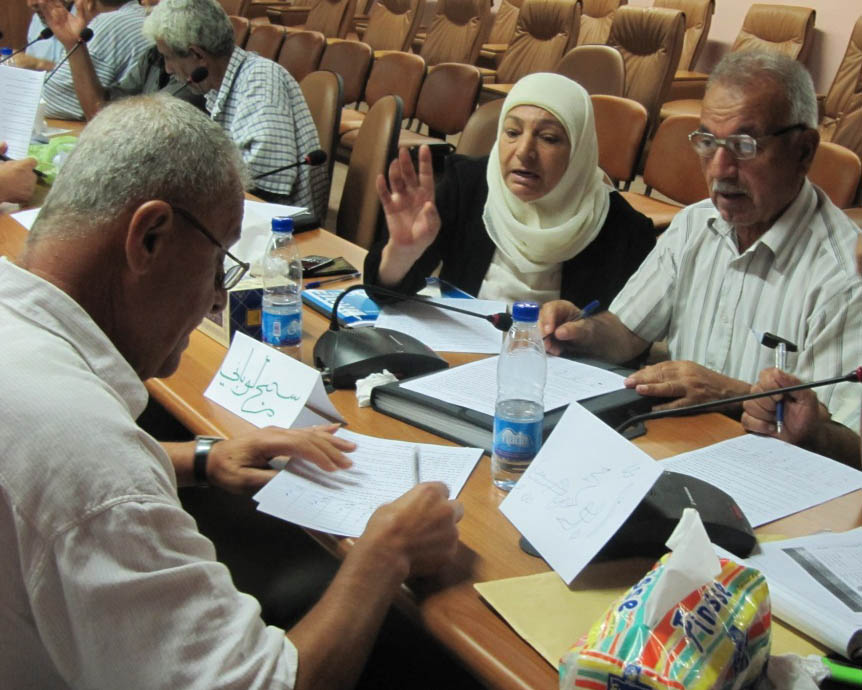

Strengthening Palestinian self-governance to build peace in Lebanon

In a small meeting room in the Nahr el Bared refugee camp in North Lebanon, 25 men and one woman are working to solidify peace between Palestinian refugees and their Lebanese hosts.
It’s part of an effort spearheaded by the UN to ease tensions in the region by strengthening the Lebanese local authorities and the Popular Committees (PCs) that are the de facto government of Palestinian refugee camps.
For more than 30 years, the running of the refugee camps, home to some 400,000 Palestinians, has depended on a tenuous balance of power between 23 different Palestinian factions and political parties. In 2007, an armed conflict broke out between the Lebanese Army and an insurgent faction in Nahr el Bared. The camp was totally destroyed, 500 people were killed and 40,000 were internally displaced. The event worsened the intrinsic mistrust between Lebanese and Palestinian communities, a dynamic that has the potential to destabilize the country.
Now, a programme funded by the MDG-F is providing training to community groups and Popular Committees from refugee camps in northern Lebanon like Nahr el Bared to help the PCs be more inclusive and accountable, and to be better administrators and representatives of the refugees. Strengthening the camps’ governance is seen as a way to help ease tensions amongst Palestinian groups and between Palestinian and Lebanese communities.
“Thanks to the workshops I have become an instrumental member of my organization,” says 64-year-old Farida Bazzi, a member of the Palestine Women Union who was invited to join the workshop in order to familiarize PC participants with the idea of including women in their groups.
To date, PCs have never had women or youth members. The UN programme is working to increase the active participation of women and young people in Palestinian society and decision-making.
Bazzi, a mother of six and the only woman included in the workshop, says she believes that after the training she will be in a better position to help other women in the camp. “Despite all my previous experiences I have learned many new things. I used to deal with my projects in a different manner but now, after the training, I have a clear way to follow to get better results… I hope this training will be given to younger women’s groups who work in the field. They need such kind of support.”
The three-phase training programme, which began in February 2010, includes awareness sessions on human rights instruments, refugees’ rights and gender issues, as well as training in soft skills such as communication, negotiation and conflict resolution. Participants also receive basic IT, technical and administrative skills training, and, in the third phase, implement a community development project.
A key objective of the programme is to reduce the risk of a relapse into violence in Lebanon by promoting equity and socio-economic development. Reducing poverty is among the Millennium Development Goals, eight global targets set for 2015 that the MDG-F was created to help achieve.
The MDG-F has been a pioneer in addressing the need to work with Popular Committees in Lebanon’s refugee camps as a means to help Palestinian communities improve their self-governance, build peace and increase their wellbeing. In some cases, the camps are virtually closed enclaves at the periphery of cities; the economic, social and political marginalization of their residents from Lebanese society makes it difficult for refugees to escape a multi-generational cycle of poverty.
Hamzeh Khader, a 43-year-old member of the Popular Committee in Nahr el Bared camp, said he had never received any training for his work, and that the UN workshop has made him more prepared and motivated to perform his duties and to represent the Palestinians’ interests effectively.
“The training encouraged me to go back to school after 23 years. What we got in a one-day workshop is equivalent to some full courses that professors are still teaching at the university,” he said. Abu Salim, the chairman of the Nahr el Bared camp and a workshop participant, said he would deliver the training he received to his political colleagues.
For Farida Bazzi, who has worked in public relations and micro-credit, and is a member of the main political party in the camps as well as a community representative for Palestinians outside the camps, the workshop helped her build valuable personal and professional relationships among the Popular Committees. “The training has not only benefited my professional life but also my personal one. I have learned to count to one million before reacting or making any important decision. My new attitude has helped me to improve my relationships with others.”
The PC capacity-building activity is led by the United Nations Relief and Works Agency (UNRWA) as part of the MDG-F-funded Conflict Prevention and Peace Building in North Lebanon programme. Other participating agencies are UNDP, UNICEF, ILO, UNESCO and UNFPA.
Click here to read about the MDG-F's work in Lebanon.